Business Law Assignment: FWPL and Corporate Law Issues
VerifiedAdded on 2020/03/23
|8
|1586
|44
Homework Assignment
AI Summary
This business law assignment analyzes three key issues related to the Corporations Act 2001 in Australia. The first issue examines the steps Galli might consider regarding a failure in dividend payment, referencing Section 233 of the Corporations Act, and determining the rights of shareholders. The second issue explores the advantages and requirements of conducting a share buyback, detailing the rules and guidelines provided by the Australian Securities & Investment Commission (ASIC) under Section 257B. The third issue discusses whether FWPL can remove Class A shares, outlining the conditions that must be fulfilled under Section 256B(1), including the need for shareholder consent and the process for selective or equal share reduction. The assignment provides a comprehensive overview of corporate law principles, including shareholder rights, share buybacks, and share reduction procedures.
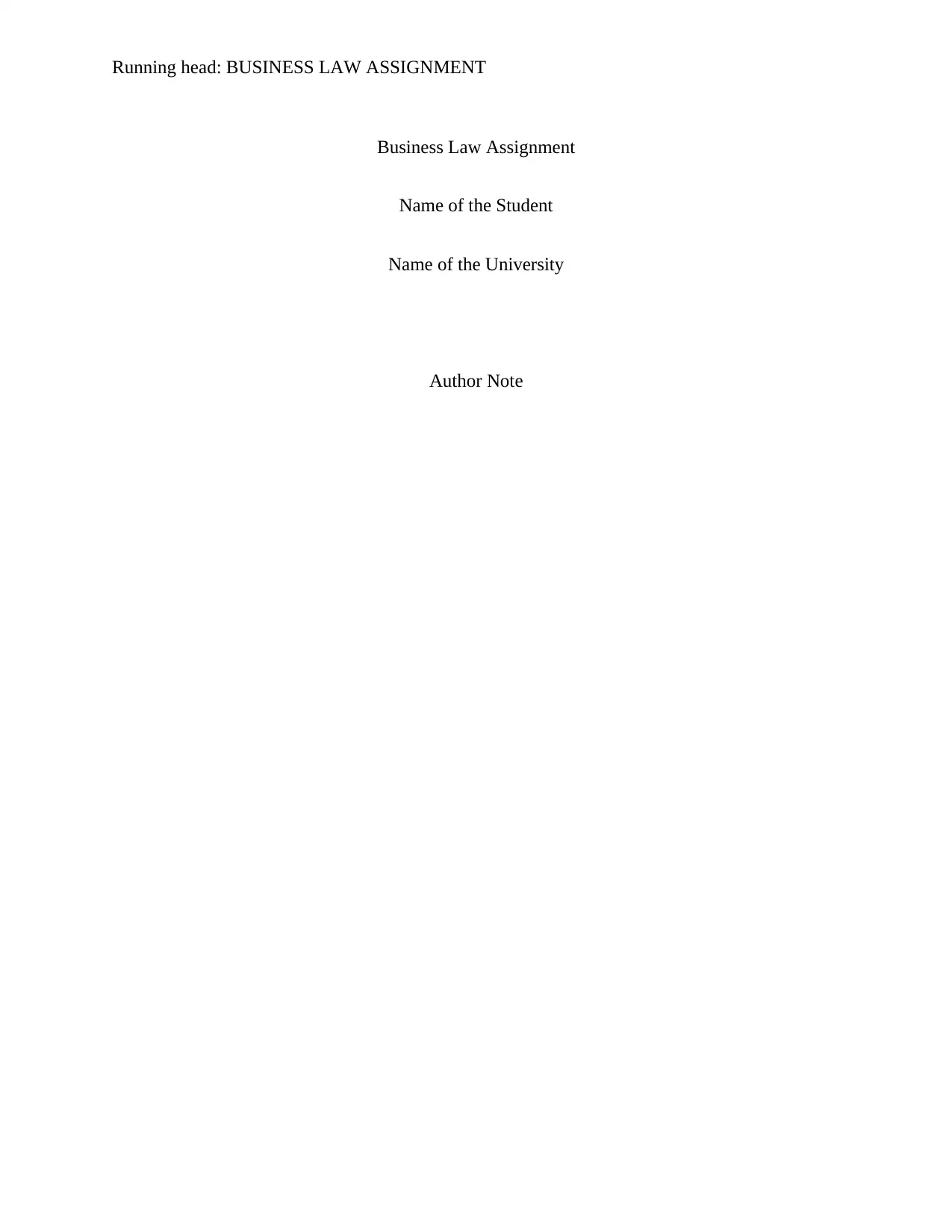
Running head: BUSINESS LAW ASSIGNMENT
Business Law Assignment
Name of the Student
Name of the University
Author Note
Business Law Assignment
Name of the Student
Name of the University
Author Note
Paraphrase This Document
Need a fresh take? Get an instant paraphrase of this document with our AI Paraphraser
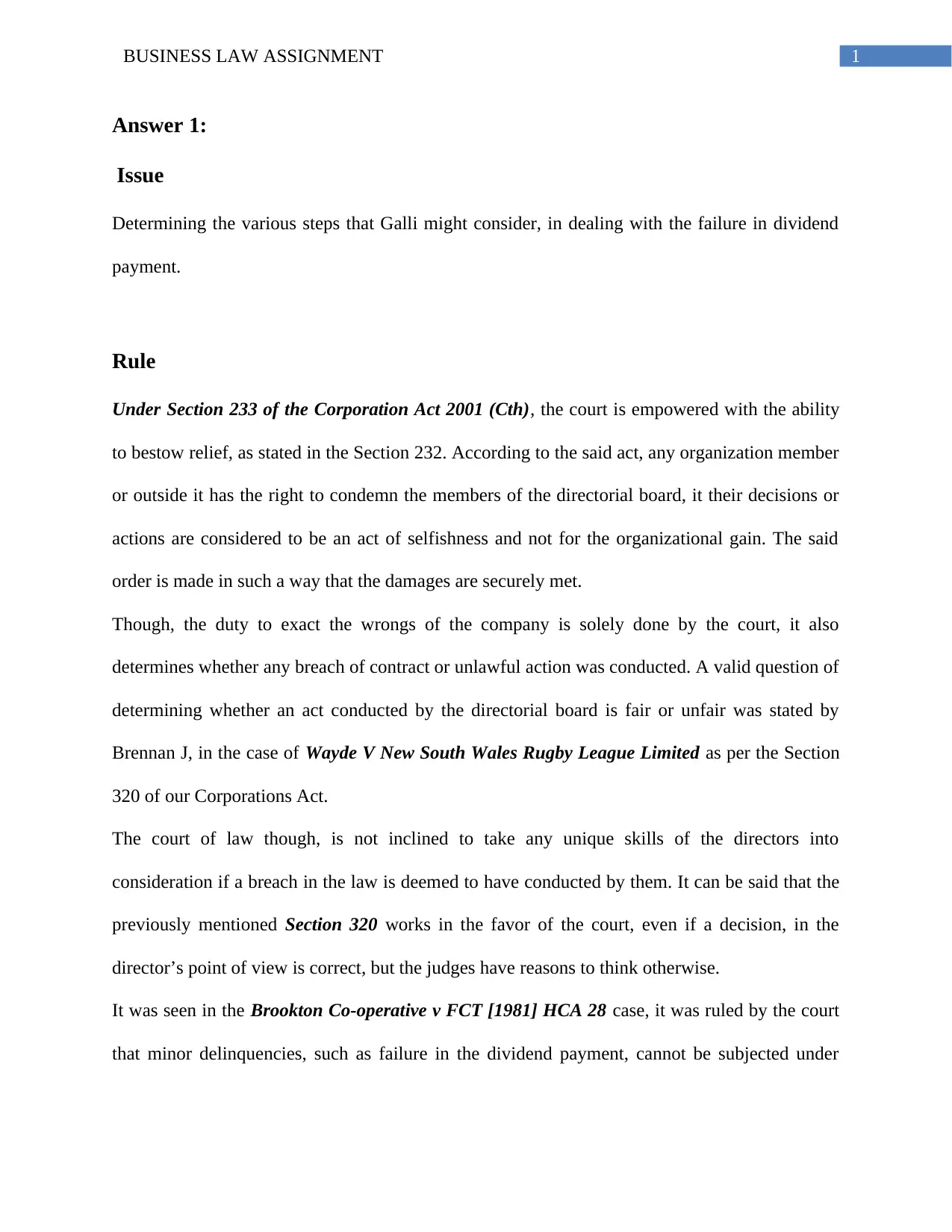
1BUSINESS LAW ASSIGNMENT
Answer 1:
Issue
Determining the various steps that Galli might consider, in dealing with the failure in dividend
payment.
Rule
Under Section 233 of the Corporation Act 2001 (Cth), the court is empowered with the ability
to bestow relief, as stated in the Section 232. According to the said act, any organization member
or outside it has the right to condemn the members of the directorial board, it their decisions or
actions are considered to be an act of selfishness and not for the organizational gain. The said
order is made in such a way that the damages are securely met.
Though, the duty to exact the wrongs of the company is solely done by the court, it also
determines whether any breach of contract or unlawful action was conducted. A valid question of
determining whether an act conducted by the directorial board is fair or unfair was stated by
Brennan J, in the case of Wayde V New South Wales Rugby League Limited as per the Section
320 of our Corporations Act.
The court of law though, is not inclined to take any unique skills of the directors into
consideration if a breach in the law is deemed to have conducted by them. It can be said that the
previously mentioned Section 320 works in the favor of the court, even if a decision, in the
director’s point of view is correct, but the judges have reasons to think otherwise.
It was seen in the Brookton Co-operative v FCT [1981] HCA 28 case, it was ruled by the court
that minor delinquencies, such as failure in the dividend payment, cannot be subjected under
Answer 1:
Issue
Determining the various steps that Galli might consider, in dealing with the failure in dividend
payment.
Rule
Under Section 233 of the Corporation Act 2001 (Cth), the court is empowered with the ability
to bestow relief, as stated in the Section 232. According to the said act, any organization member
or outside it has the right to condemn the members of the directorial board, it their decisions or
actions are considered to be an act of selfishness and not for the organizational gain. The said
order is made in such a way that the damages are securely met.
Though, the duty to exact the wrongs of the company is solely done by the court, it also
determines whether any breach of contract or unlawful action was conducted. A valid question of
determining whether an act conducted by the directorial board is fair or unfair was stated by
Brennan J, in the case of Wayde V New South Wales Rugby League Limited as per the Section
320 of our Corporations Act.
The court of law though, is not inclined to take any unique skills of the directors into
consideration if a breach in the law is deemed to have conducted by them. It can be said that the
previously mentioned Section 320 works in the favor of the court, even if a decision, in the
director’s point of view is correct, but the judges have reasons to think otherwise.
It was seen in the Brookton Co-operative v FCT [1981] HCA 28 case, it was ruled by the court
that minor delinquencies, such as failure in the dividend payment, cannot be subjected under
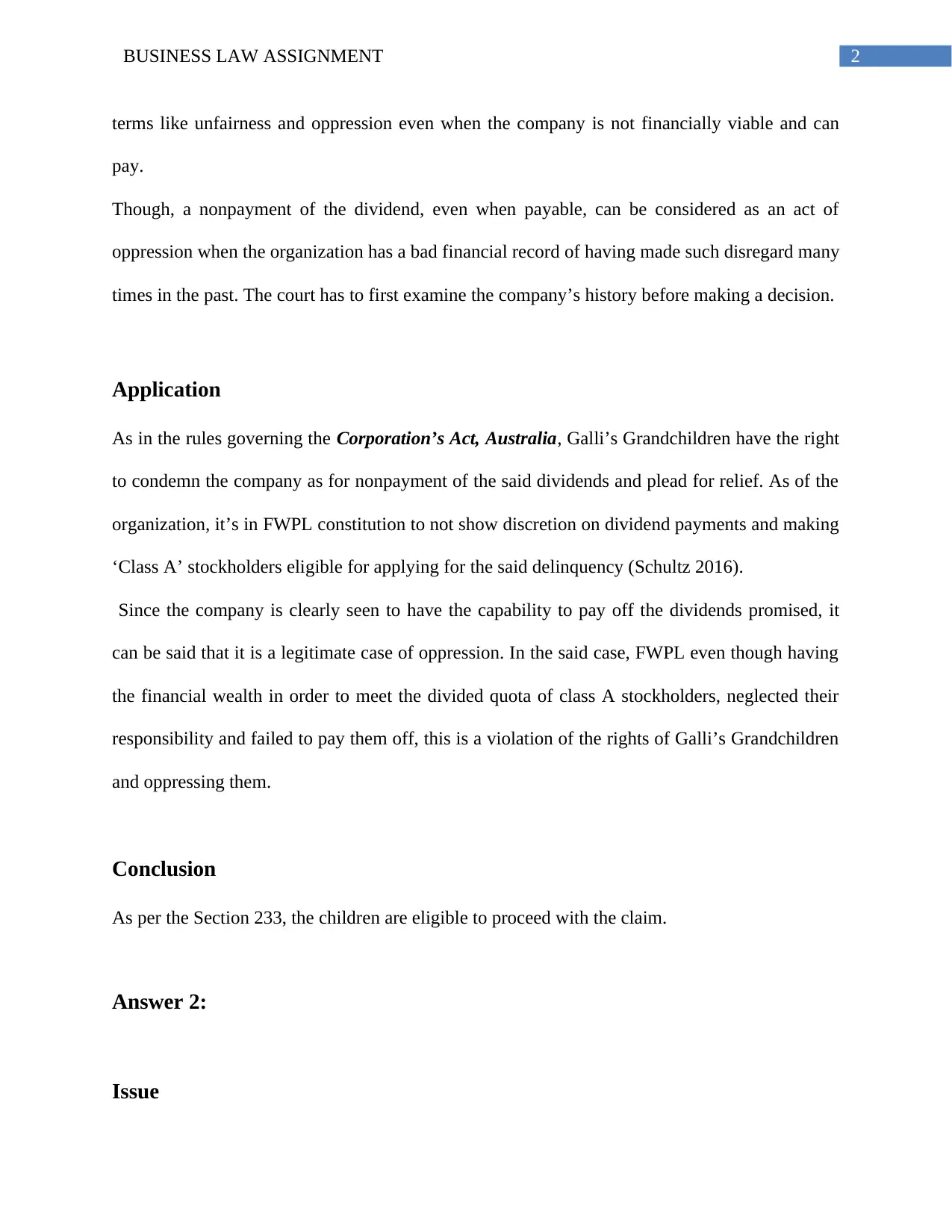
2BUSINESS LAW ASSIGNMENT
terms like unfairness and oppression even when the company is not financially viable and can
pay.
Though, a nonpayment of the dividend, even when payable, can be considered as an act of
oppression when the organization has a bad financial record of having made such disregard many
times in the past. The court has to first examine the company’s history before making a decision.
Application
As in the rules governing the Corporation’s Act, Australia, Galli’s Grandchildren have the right
to condemn the company as for nonpayment of the said dividends and plead for relief. As of the
organization, it’s in FWPL constitution to not show discretion on dividend payments and making
‘Class A’ stockholders eligible for applying for the said delinquency (Schultz 2016).
Since the company is clearly seen to have the capability to pay off the dividends promised, it
can be said that it is a legitimate case of oppression. In the said case, FWPL even though having
the financial wealth in order to meet the divided quota of class A stockholders, neglected their
responsibility and failed to pay them off, this is a violation of the rights of Galli’s Grandchildren
and oppressing them.
Conclusion
As per the Section 233, the children are eligible to proceed with the claim.
Answer 2:
Issue
terms like unfairness and oppression even when the company is not financially viable and can
pay.
Though, a nonpayment of the dividend, even when payable, can be considered as an act of
oppression when the organization has a bad financial record of having made such disregard many
times in the past. The court has to first examine the company’s history before making a decision.
Application
As in the rules governing the Corporation’s Act, Australia, Galli’s Grandchildren have the right
to condemn the company as for nonpayment of the said dividends and plead for relief. As of the
organization, it’s in FWPL constitution to not show discretion on dividend payments and making
‘Class A’ stockholders eligible for applying for the said delinquency (Schultz 2016).
Since the company is clearly seen to have the capability to pay off the dividends promised, it
can be said that it is a legitimate case of oppression. In the said case, FWPL even though having
the financial wealth in order to meet the divided quota of class A stockholders, neglected their
responsibility and failed to pay them off, this is a violation of the rights of Galli’s Grandchildren
and oppressing them.
Conclusion
As per the Section 233, the children are eligible to proceed with the claim.
Answer 2:
Issue
⊘ This is a preview!⊘
Do you want full access?
Subscribe today to unlock all pages.

Trusted by 1+ million students worldwide
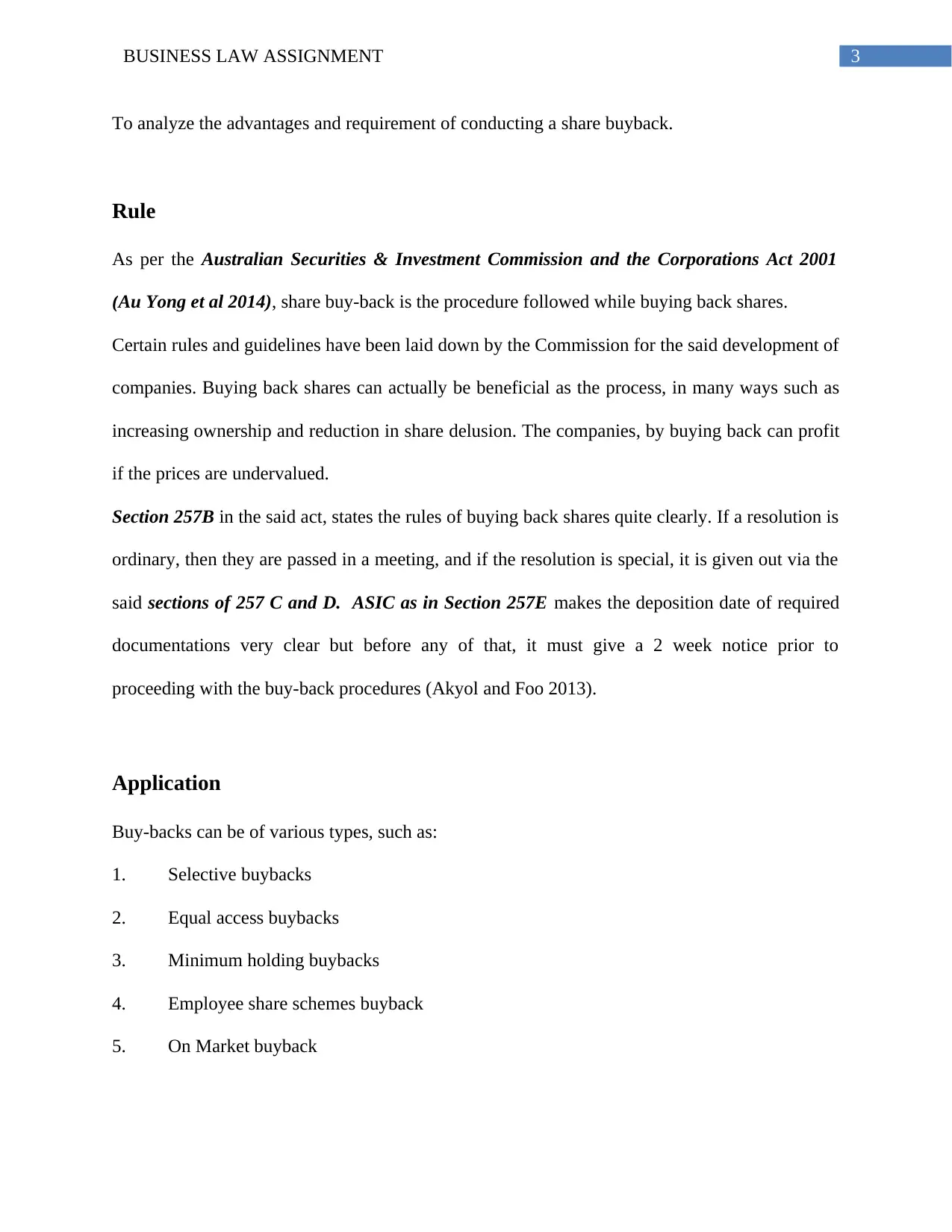
3BUSINESS LAW ASSIGNMENT
To analyze the advantages and requirement of conducting a share buyback.
Rule
As per the Australian Securities & Investment Commission and the Corporations Act 2001
(Au Yong et al 2014), share buy-back is the procedure followed while buying back shares.
Certain rules and guidelines have been laid down by the Commission for the said development of
companies. Buying back shares can actually be beneficial as the process, in many ways such as
increasing ownership and reduction in share delusion. The companies, by buying back can profit
if the prices are undervalued.
Section 257B in the said act, states the rules of buying back shares quite clearly. If a resolution is
ordinary, then they are passed in a meeting, and if the resolution is special, it is given out via the
said sections of 257 C and D. ASIC as in Section 257E makes the deposition date of required
documentations very clear but before any of that, it must give a 2 week notice prior to
proceeding with the buy-back procedures (Akyol and Foo 2013).
Application
Buy-backs can be of various types, such as:
1. Selective buybacks
2. Equal access buybacks
3. Minimum holding buybacks
4. Employee share schemes buyback
5. On Market buyback
To analyze the advantages and requirement of conducting a share buyback.
Rule
As per the Australian Securities & Investment Commission and the Corporations Act 2001
(Au Yong et al 2014), share buy-back is the procedure followed while buying back shares.
Certain rules and guidelines have been laid down by the Commission for the said development of
companies. Buying back shares can actually be beneficial as the process, in many ways such as
increasing ownership and reduction in share delusion. The companies, by buying back can profit
if the prices are undervalued.
Section 257B in the said act, states the rules of buying back shares quite clearly. If a resolution is
ordinary, then they are passed in a meeting, and if the resolution is special, it is given out via the
said sections of 257 C and D. ASIC as in Section 257E makes the deposition date of required
documentations very clear but before any of that, it must give a 2 week notice prior to
proceeding with the buy-back procedures (Akyol and Foo 2013).
Application
Buy-backs can be of various types, such as:
1. Selective buybacks
2. Equal access buybacks
3. Minimum holding buybacks
4. Employee share schemes buyback
5. On Market buyback
Paraphrase This Document
Need a fresh take? Get an instant paraphrase of this document with our AI Paraphraser
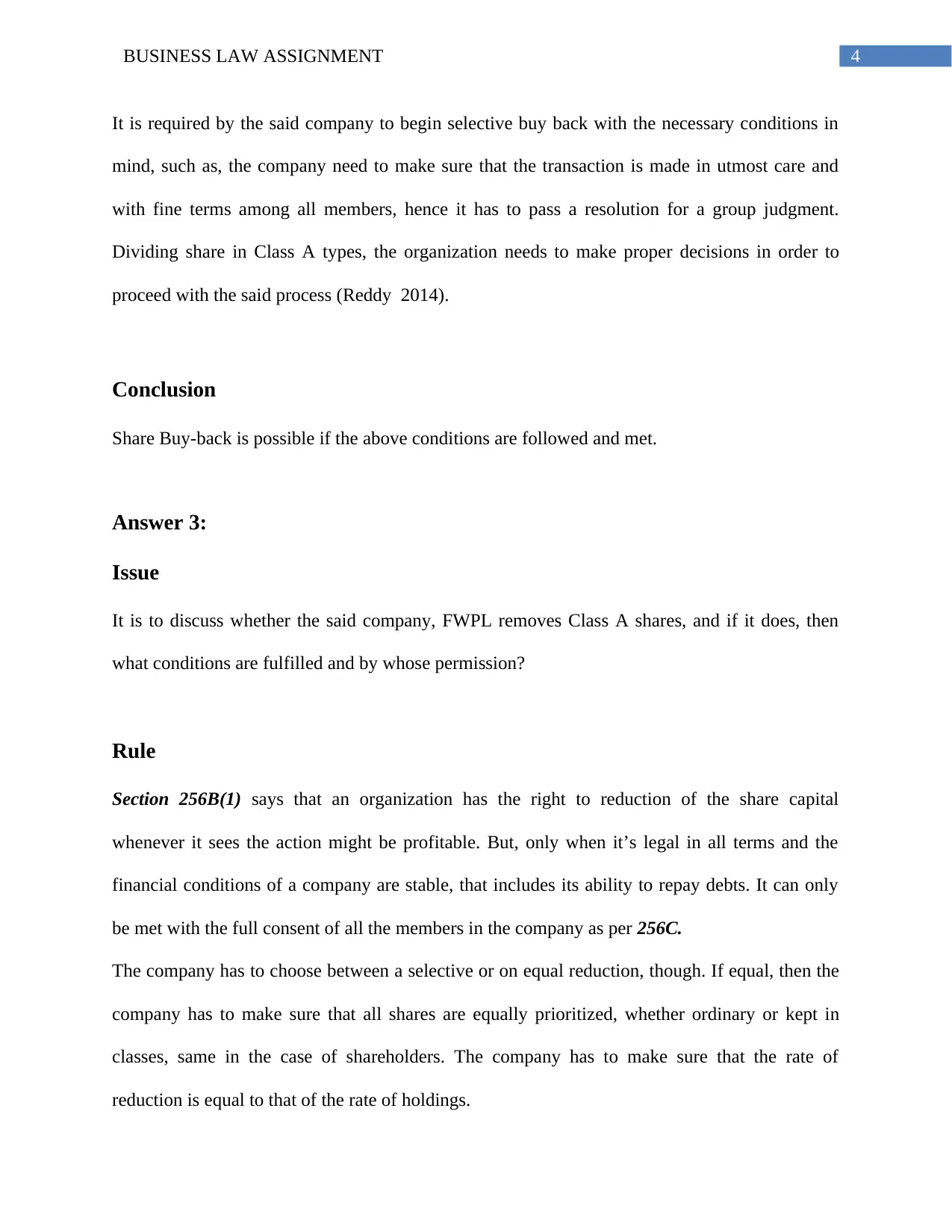
4BUSINESS LAW ASSIGNMENT
It is required by the said company to begin selective buy back with the necessary conditions in
mind, such as, the company need to make sure that the transaction is made in utmost care and
with fine terms among all members, hence it has to pass a resolution for a group judgment.
Dividing share in Class A types, the organization needs to make proper decisions in order to
proceed with the said process (Reddy 2014).
Conclusion
Share Buy-back is possible if the above conditions are followed and met.
Answer 3:
Issue
It is to discuss whether the said company, FWPL removes Class A shares, and if it does, then
what conditions are fulfilled and by whose permission?
Rule
Section 256B(1) says that an organization has the right to reduction of the share capital
whenever it sees the action might be profitable. But, only when it’s legal in all terms and the
financial conditions of a company are stable, that includes its ability to repay debts. It can only
be met with the full consent of all the members in the company as per 256C.
The company has to choose between a selective or on equal reduction, though. If equal, then the
company has to make sure that all shares are equally prioritized, whether ordinary or kept in
classes, same in the case of shareholders. The company has to make sure that the rate of
reduction is equal to that of the rate of holdings.
It is required by the said company to begin selective buy back with the necessary conditions in
mind, such as, the company need to make sure that the transaction is made in utmost care and
with fine terms among all members, hence it has to pass a resolution for a group judgment.
Dividing share in Class A types, the organization needs to make proper decisions in order to
proceed with the said process (Reddy 2014).
Conclusion
Share Buy-back is possible if the above conditions are followed and met.
Answer 3:
Issue
It is to discuss whether the said company, FWPL removes Class A shares, and if it does, then
what conditions are fulfilled and by whose permission?
Rule
Section 256B(1) says that an organization has the right to reduction of the share capital
whenever it sees the action might be profitable. But, only when it’s legal in all terms and the
financial conditions of a company are stable, that includes its ability to repay debts. It can only
be met with the full consent of all the members in the company as per 256C.
The company has to choose between a selective or on equal reduction, though. If equal, then the
company has to make sure that all shares are equally prioritized, whether ordinary or kept in
classes, same in the case of shareholders. The company has to make sure that the rate of
reduction is equal to that of the rate of holdings.
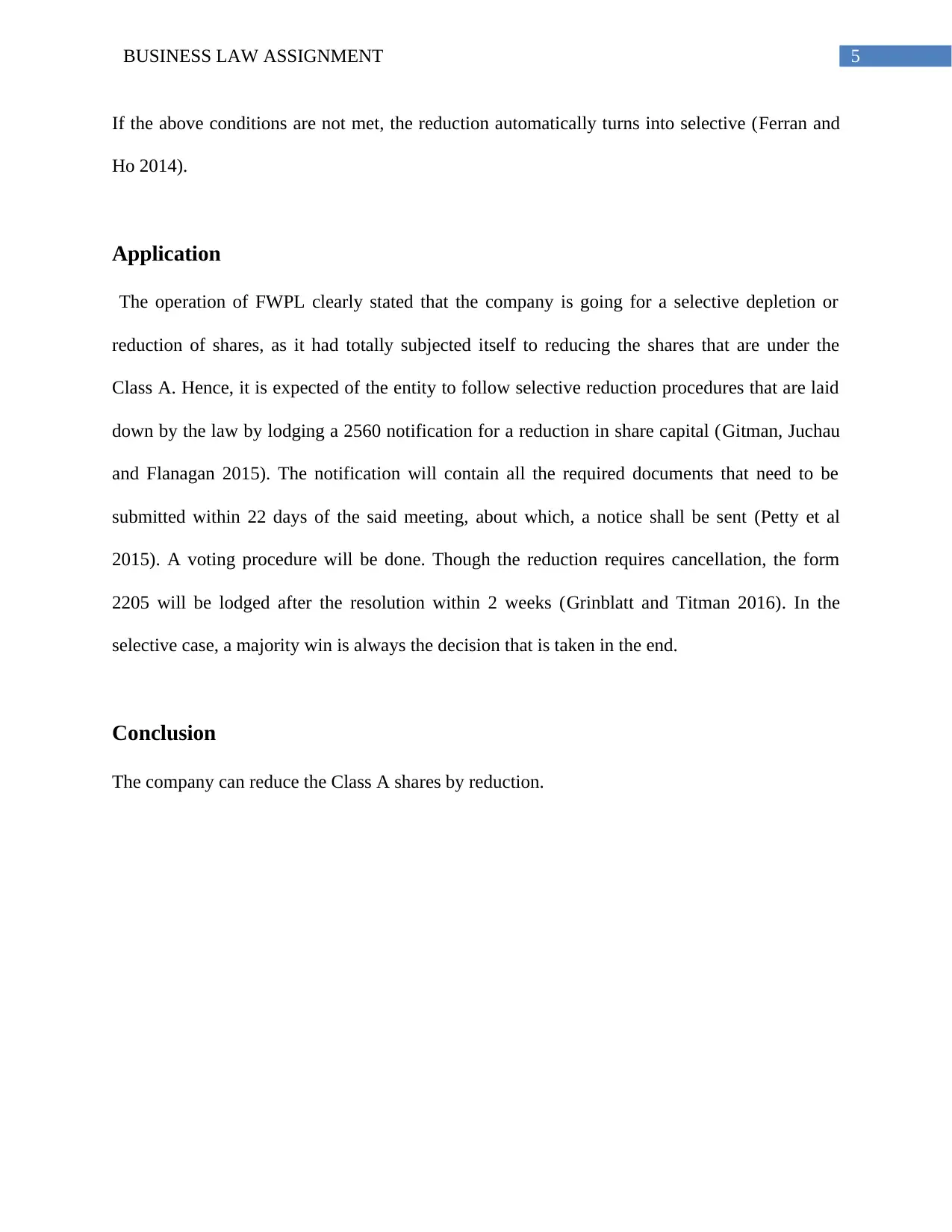
5BUSINESS LAW ASSIGNMENT
If the above conditions are not met, the reduction automatically turns into selective (Ferran and
Ho 2014).
Application
The operation of FWPL clearly stated that the company is going for a selective depletion or
reduction of shares, as it had totally subjected itself to reducing the shares that are under the
Class A. Hence, it is expected of the entity to follow selective reduction procedures that are laid
down by the law by lodging a 2560 notification for a reduction in share capital (Gitman, Juchau
and Flanagan 2015). The notification will contain all the required documents that need to be
submitted within 22 days of the said meeting, about which, a notice shall be sent (Petty et al
2015). A voting procedure will be done. Though the reduction requires cancellation, the form
2205 will be lodged after the resolution within 2 weeks (Grinblatt and Titman 2016). In the
selective case, a majority win is always the decision that is taken in the end.
Conclusion
The company can reduce the Class A shares by reduction.
If the above conditions are not met, the reduction automatically turns into selective (Ferran and
Ho 2014).
Application
The operation of FWPL clearly stated that the company is going for a selective depletion or
reduction of shares, as it had totally subjected itself to reducing the shares that are under the
Class A. Hence, it is expected of the entity to follow selective reduction procedures that are laid
down by the law by lodging a 2560 notification for a reduction in share capital (Gitman, Juchau
and Flanagan 2015). The notification will contain all the required documents that need to be
submitted within 22 days of the said meeting, about which, a notice shall be sent (Petty et al
2015). A voting procedure will be done. Though the reduction requires cancellation, the form
2205 will be lodged after the resolution within 2 weeks (Grinblatt and Titman 2016). In the
selective case, a majority win is always the decision that is taken in the end.
Conclusion
The company can reduce the Class A shares by reduction.
⊘ This is a preview!⊘
Do you want full access?
Subscribe today to unlock all pages.

Trusted by 1+ million students worldwide
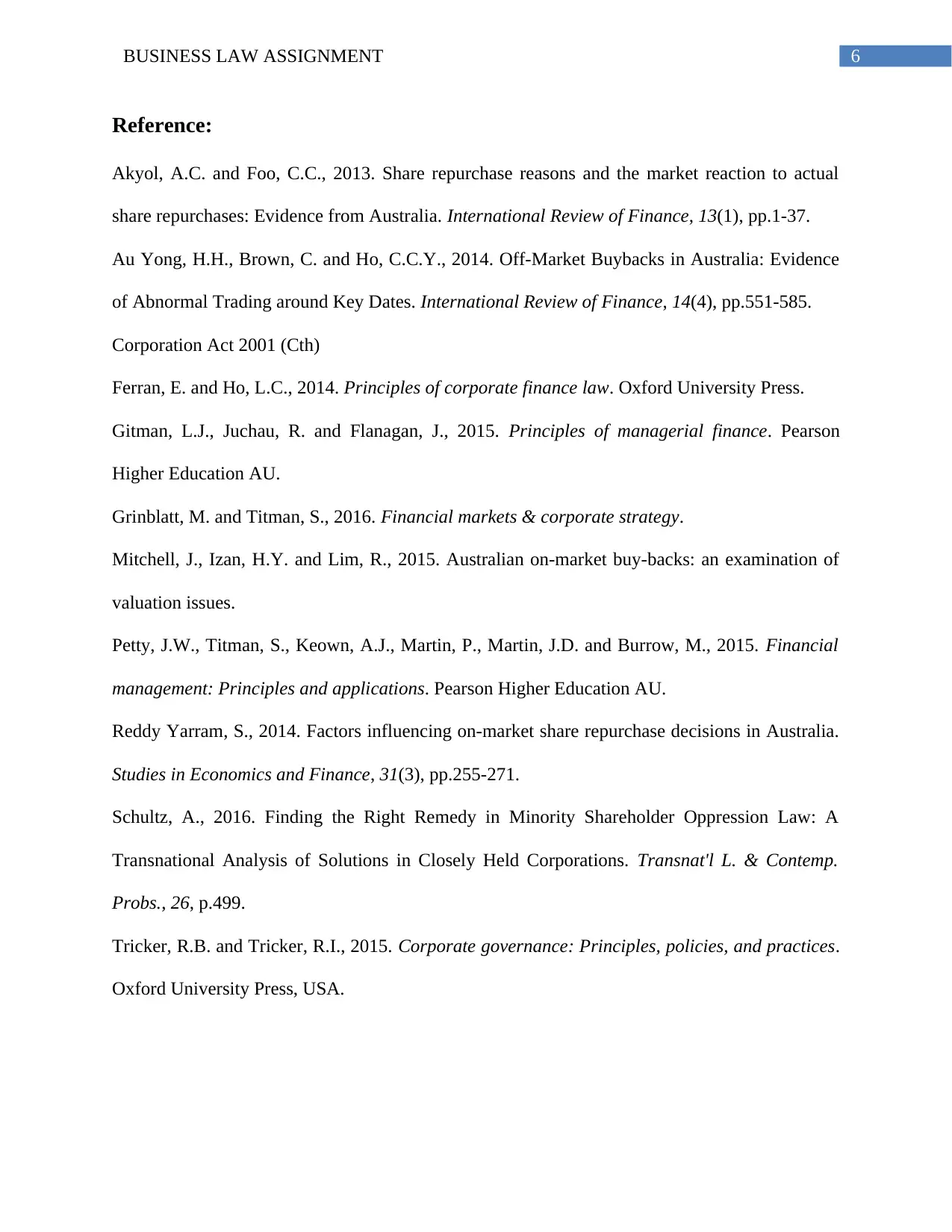
6BUSINESS LAW ASSIGNMENT
Reference:
Akyol, A.C. and Foo, C.C., 2013. Share repurchase reasons and the market reaction to actual
share repurchases: Evidence from Australia. International Review of Finance, 13(1), pp.1-37.
Au Yong, H.H., Brown, C. and Ho, C.C.Y., 2014. Off‐Market Buybacks in Australia: Evidence
of Abnormal Trading around Key Dates. International Review of Finance, 14(4), pp.551-585.
Corporation Act 2001 (Cth)
Ferran, E. and Ho, L.C., 2014. Principles of corporate finance law. Oxford University Press.
Gitman, L.J., Juchau, R. and Flanagan, J., 2015. Principles of managerial finance. Pearson
Higher Education AU.
Grinblatt, M. and Titman, S., 2016. Financial markets & corporate strategy.
Mitchell, J., Izan, H.Y. and Lim, R., 2015. Australian on-market buy-backs: an examination of
valuation issues.
Petty, J.W., Titman, S., Keown, A.J., Martin, P., Martin, J.D. and Burrow, M., 2015. Financial
management: Principles and applications. Pearson Higher Education AU.
Reddy Yarram, S., 2014. Factors influencing on-market share repurchase decisions in Australia.
Studies in Economics and Finance, 31(3), pp.255-271.
Schultz, A., 2016. Finding the Right Remedy in Minority Shareholder Oppression Law: A
Transnational Analysis of Solutions in Closely Held Corporations. Transnat'l L. & Contemp.
Probs., 26, p.499.
Tricker, R.B. and Tricker, R.I., 2015. Corporate governance: Principles, policies, and practices.
Oxford University Press, USA.
Reference:
Akyol, A.C. and Foo, C.C., 2013. Share repurchase reasons and the market reaction to actual
share repurchases: Evidence from Australia. International Review of Finance, 13(1), pp.1-37.
Au Yong, H.H., Brown, C. and Ho, C.C.Y., 2014. Off‐Market Buybacks in Australia: Evidence
of Abnormal Trading around Key Dates. International Review of Finance, 14(4), pp.551-585.
Corporation Act 2001 (Cth)
Ferran, E. and Ho, L.C., 2014. Principles of corporate finance law. Oxford University Press.
Gitman, L.J., Juchau, R. and Flanagan, J., 2015. Principles of managerial finance. Pearson
Higher Education AU.
Grinblatt, M. and Titman, S., 2016. Financial markets & corporate strategy.
Mitchell, J., Izan, H.Y. and Lim, R., 2015. Australian on-market buy-backs: an examination of
valuation issues.
Petty, J.W., Titman, S., Keown, A.J., Martin, P., Martin, J.D. and Burrow, M., 2015. Financial
management: Principles and applications. Pearson Higher Education AU.
Reddy Yarram, S., 2014. Factors influencing on-market share repurchase decisions in Australia.
Studies in Economics and Finance, 31(3), pp.255-271.
Schultz, A., 2016. Finding the Right Remedy in Minority Shareholder Oppression Law: A
Transnational Analysis of Solutions in Closely Held Corporations. Transnat'l L. & Contemp.
Probs., 26, p.499.
Tricker, R.B. and Tricker, R.I., 2015. Corporate governance: Principles, policies, and practices.
Oxford University Press, USA.
Paraphrase This Document
Need a fresh take? Get an instant paraphrase of this document with our AI Paraphraser

7BUSINESS LAW ASSIGNMENT
1 out of 8
Related Documents
Your All-in-One AI-Powered Toolkit for Academic Success.
+13062052269
info@desklib.com
Available 24*7 on WhatsApp / Email
![[object Object]](/_next/static/media/star-bottom.7253800d.svg)
Unlock your academic potential
Copyright © 2020–2026 A2Z Services. All Rights Reserved. Developed and managed by ZUCOL.





